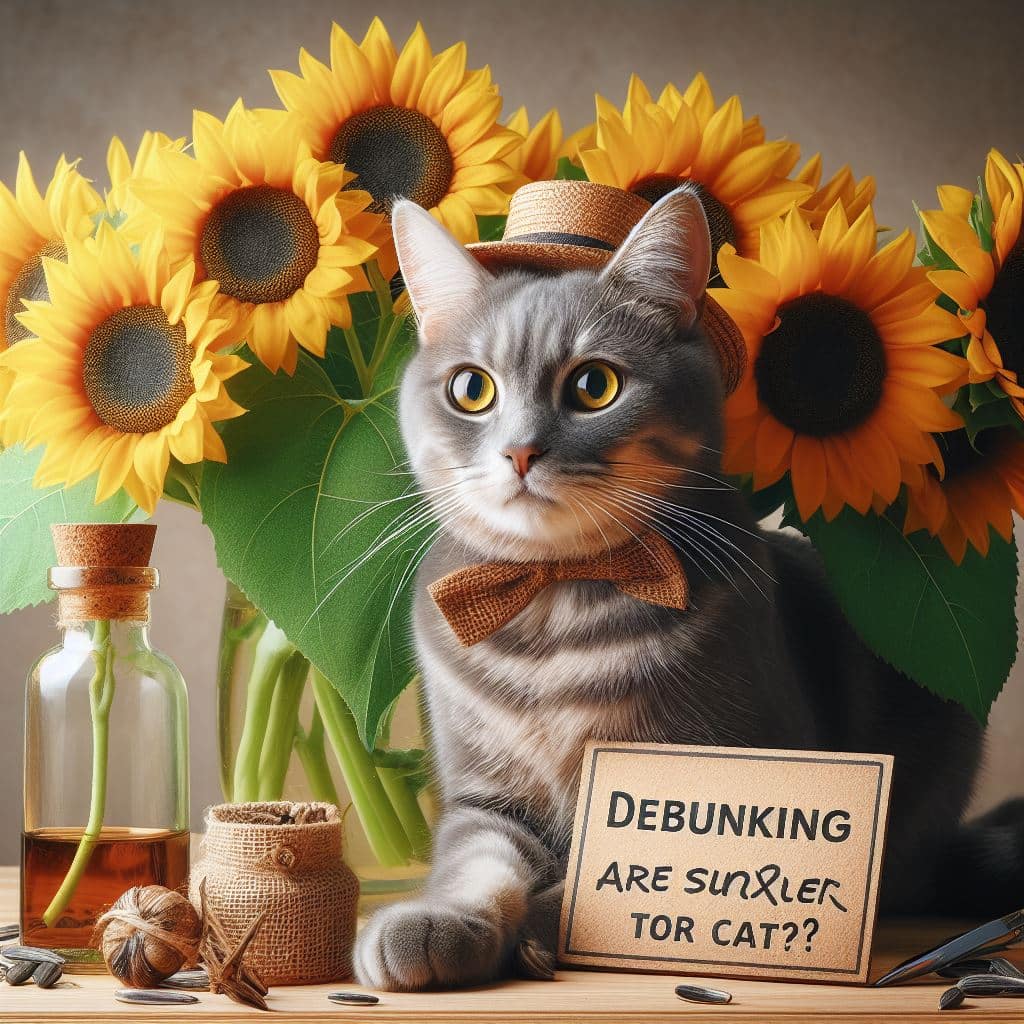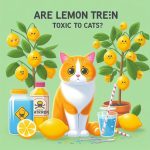Debunking the myth surrounding sunflowers and cats is crucial for ensuring a safe environment for our feline friends. Many cat owners wonder, “Are sunflowers toxic to cats?”. It’s important to address this concern by exploring the origins of the myth, understanding sunflower toxicity in cats, recognizing the symptoms. Learning about the appropriate treatment. Additionally, we’ll provide insights into safe alternatives for cat-friendly gardening and the importance of consulting a veterinarian for expert advice. Let’s delve into the facts and dispel the misconceptions about sunflowers and cats.
The Origins of the Myth
The belief that sunflowers are toxic to cats has been circulating for quite some time, causing concern among cat owners. This myth likely stems from the fact that some plants can be harmful to pets if ingested. However, it’s important to distinguish between myths and facts when it comes to sunflowers and their potential impact on cats.

The origins of the myth can often be traced back to misconceptions about certain plant families. Their toxicity to animals. Misinformation or mistaken association with other toxic plants. may have contributed to the belief that sunflowers pose a threat to cats. Additionally, the internet and social media often play a role in perpetuating such myths. leading to widespread misunderstanding and unnecessary worry among pet owners.
It is essential to debunk this myth by examining scientific evidence and consulting reliable sources to provide accurate information to pet owners. Understanding the truth about sunflowers and cats can help alleviate unnecessary concerns and promote a better understanding of pet safety around plants. Let’s delve deeper into the facts to dispel the misconception and provide clarity on this topic.
Common Concerns about Sunflowers and Cats
When it comes to keeping our furry friends safe. it’s natural to have concerns about the plants and flowers around our homes. Sunflowers are a popular choice in gardens and floral arrangements, but many cat owners wonder if they pose a threat to their feline companions. Here are some common concerns regarding sunflowers and cats:
Toxicity: One of the primary concerns is whether sunflowers are toxic to cats. Many cat owners worry that their curious pets may chew on sunflower leaves or petals, leading to potential toxicity.
Allergic Reactions: Some cat owners are also concerned about the possibility of their pets having allergic reactions to sunflowers. They may worry about the pollen or other components causing skin irritation or respiratory issues in their cats.
Ingestion: There is a fear that cats may ingest parts of the sunflower plant, such as the leaves, stems, or seeds, leading to digestive issues or other health problems.
Understanding these concerns is essential for cat owners who want to ensure a safe environment for their pets. In the next sections, we will delve into the details of sunflower toxicity in cats, including symptoms to watch out for and how to handle any potential issues.
Understanding Sunflower Toxicity in Cats
When it comes to the question, “are sunflowers toxic to cats,” it’s essential to understand the potential risks. Associated with these vibrant blooms. While sunflowers are not among the most toxic plants for felines, certain parts of the flower can still pose a danger if ingested.

Potential Risks:
- Ingestion of Petals and Stems: Cats may consume the petals or stems of sunflowers, which can lead to gastrointestinal upset.
- Possible Irritation: The rough texture of sunflower stems and leaves may cause irritation in the oral cavity and digestive tract if ingested in large quantities.
Toxic Components:
The toxicity of sunflowers to cats is primarily due to the presence of sesquiterpene lactones, which can cause mild to moderate gastrointestinal upset. However, it’s important to note that the level of toxicity is relatively low compared to some other plants.
Comparison Table:
To provide a clearer understanding, here is a comparison of sunflower toxicity with other common plants:
| Plant | Level of Toxicity to Cats |
|---|---|
| Lilies | Highly Toxic |
| Aloe Vera | Mildly Toxic |
| Sunflowers | Mild to Moderate Toxicity |
Awareness and Prevention:
While sunflowers may not be highly toxic to cats, it’s crucial to be mindful of their potential effects. Being aware of the risks can help in preventing accidental ingestion and minimizing any potential harm to cats.
By understanding the level of toxicity associated with sunflowers and taking the necessary precautions, cat owners can ensure a safe and cat-friendly environment in their homes and gardens.
Symptoms of Sunflower Toxicity in Cats
When considering the question “are sunflowers toxic to cats,”. it’s essential to be aware of the potential symptoms of sunflower toxicity in cats. While sunflowers are not highly toxic to cats, there are some symptoms to watch out for if your feline friend ingests any part of the plant.
Common Symptoms to Watch for:
- Gastrointestinal Distress: Cats may experience symptoms such as vomiting, diarrhea, or general discomfort in the abdominal area.
- Lethargy and Weakness: If your cat has ingested a toxic part of the sunflower, they might display signs of decreased energy levels and weakness.
- Loss of Appetite: A sudden disinterest in food could indicate ingestion of a toxic part of the sunflower plant.
- Drooling and Pawing at the Mouth: Excessive drooling or pawing at the mouth could be a sign of discomfort or irritation caused by ingestion.

If your cat displays any of these symptoms and you suspect sunflower toxicity, it’s important to seek veterinary care promptly. While the symptoms of sunflower toxicity in cats are generally mild, it’s always best to err on the side of caution and seek professional guidance. Keep in mind that not all cats will display the same symptoms, and individual reactions may vary.
Understanding these potential symptoms can help you recognize any issues promptly and ensure the well-being of your feline companion.
Treatment for Sunflower Toxicity in Cats
If you suspect that your cat has ingested any part of a sunflower and is showing symptoms of toxicity. it’s crucial to seek immediate veterinary attention. Here are the essential steps in treating sunflower toxicity in cats:
Professional Evaluation: Upon arrival at the veterinarian’s office, the cat will undergo a thorough examination. The vet will assess the severity of the poisoning and identify any immediate life-threatening issues.
Symptomatic Treatment: The veterinarian will initiate appropriate treatment based on the symptoms displayed by your cat. This may include administering medications to counteract the toxic effects and providing supportive care to stabilize your pet.
Inducing Vomiting: In some cases, the vet may induce vomiting to expel the ingested plant material from the cat’s system. This procedure should only be carried out under professional supervision, as it can be dangerous if not done correctly.
Fluid Therapy: To flush out the toxins and maintain hydration, the vet may administer intravenous fluids. This can help support the cat’s vital organ functions and aid in the elimination of toxins from the body.
Monitoring and Follow-Up: After the initial treatment, the cat will require close monitoring to ensure that it is responding well. The vet may recommend follow-up appointments to assess the cat’s progress and make any necessary adjustments to the treatment plan.
Remember, timely intervention is crucial in cases of sunflower toxicity in cats. Always prioritize professional veterinary care to ensure the best possible outcome for your feline companion.
Tips for Keeping Cats Safe around Sunflowers
When it comes to ensuring the safety of our feline friends around sunflowers. There are several precautions that cat owners can take. By following these simple tips. You can create a cat-friendly environment while still enjoying the beauty of sunflowers in your home or garden.
Limit Access: Keep sunflowers in areas that are inaccessible to your cats, such as high shelves or hanging planters. This helps prevent accidental ingestion or contact with the plant.
Supervise Outdoor Activities: If you have sunflowers in your garden, consider supervising your cat’s outdoor activities to ensure that they do not come into contact with the plants.
Provide Cat-friendly Alternatives: Encourage your cat to play and explore with cat-safe plants and toys, diverting their attention away from the sunflowers.
Monitor for Symptoms: Keep an eye out for any unusual behavior or symptoms of sunflower toxicity in cats. If you notice any signs of illness, seek veterinary care immediately.
Educate Yourself: Take the time to learn about the plants. Flowers in your home to understand any potential risks they may pose to your cat’s health.
By implementing these tips, you can create a safe and cat-friendly environment in which both your feline companion and your treasured sunflowers can coexist harmoniously.
Remember, prevention is key, and being proactive in safeguarding your cat from potential hazards is essential for their well-being.
Remember, “are sunflowers toxic to cats” is a common concern among pet owners. but with the right measures in place, you can enjoy your sunflowers while keeping your feline friends safe.
Safe Alternatives for Cat-Friendly Gardening
When it comes to creating a cat-friendly garden, it’s important to consider safe alternatives to sunflowers to ensure the well-being of your feline companions. By choosing plants that are non-toxic to cats, you can create a beautiful and thriving garden without posing any risk to your pets. Here are some safe alternatives to consider:

1. Catnip (Nepeta cataria):
- Cat-friendly herb that attracts and entices cats.
- Safe for cats to consume and interact with.
2. Spider Plant (Chlorophytum comosum):
- Non-toxic plant that is safe for cats.
- Easy to care for and adds a touch of greenery to your home.
3. Rose (Rosa):
- Certain varieties of roses are non-toxic to cats.
- Beautiful flowers that can be grown safely around feline friends.
4. African Violet (Saintpaulia):
- Indoor plant with colorful flowers.
- Non-toxic and safe for cats to be around.
5. Bamboo Palm (Chamaedorea seifrizii):
- Non-toxic houseplant that adds a tropical feel to your space.
- Safe option for cat-friendly gardening indoors.
By incorporating these safe alternatives into your gardening efforts. You can create a cat-friendly environment that enhances the well-being of your pets without sacrificing the beauty and appeal of your garden.
Remember, it’s always important to research plants thoroughly and consult with a veterinarian to ensure that any new additions to your garden are safe for your beloved feline companions.
Consulting a Veterinarian for Advice
When it comes to ensuring the well-being of your feline friends. it’s always best to consult a veterinarian for personalized advice. If you have concerns about sunflowers and their potential toxicity to cats, seeking professional guidance is crucial. Here’s why consulting a veterinarian for advice is essential:
Expert Opinion: Veterinarians are trained professionals who can provide accurate and reliable information about the potential risks associated with sunflowers and cats. They can offer tailored advice based on your specific circumstances, such as the health and behavior of your cat.
Diagnosis and Treatment: If you suspect that your cat has ingested sunflowers or is showing symptoms of toxicity. a veterinarian can assess the situation, provide a diagnosis, and recommend appropriate treatment. Prompt action is vital in such cases, and a vet can guide you through the necessary steps.
Preventive Measures: Veterinarians can offer proactive measures to prevent potential incidents of sunflower toxicity in cats. This may include advice on creating a cat-friendly environment, choosing safe plants for your home or garden, and implementing precautions to minimize risks.
Peace of Mind: By consulting a veterinarian, you can gain peace of mind knowing that you have taken the right steps to safeguard your cat’s health. Whether it’s addressing concerns about sunflowers or seeking general advice on cat-friendly practices, a vet’s expertise can be invaluable.
When in doubt, always remember that a veterinarian is the best source of guidance for addressing. any concerns related to your cat’s well-being, including the potential toxicity of sunflowers.
Remember, consulting a veterinarian for personalized advice can provide you with the specific guidance you need for your individual situation.
Debunking the Myth: Sunflowers and Cats
It’s time to dispel the misconception and shed light on the truth about sunflowers and cats. Despite the common belief that sunflowers are toxic to cats, the reality is quite different. Let’s delve into the facts and debunk this myth once and for all.
The Truth About Sunflowers and Cats
No Evidence of Toxicity: Contrary to popular belief, sunflowers are not toxic to cats. There is no scientific evidence to support the claim that sunflowers pose a threat to feline friends.
Safe for Cats: In general, sunflowers are safe plants to have around cats. As long as cats do not ingest large quantities of sunflower petals or seeds. There is minimal risk of any toxicity.
Non-Toxic Gardening: Sunflowers can be part of a cat-friendly garden without posing harm to pets. It’s essential to ensure that cats do not excessively consume any part of the sunflower plant, but overall, they can coexist safely.
Key Takeaways
- Sunflowers are not toxic to cats and can be safely grown in gardens or homes where cats reside.
- While it’s essential to monitor a cat’s interaction with sunflowers, there’s no need to worry about the presence of sunflowers posing inherent dangers to feline companions.
By debunking this myth, we can now appreciate the beauty of sunflowers without undue concern for our beloved cats’ well-being.
Remember, accurate information is crucial for creating a safe and healthy environment for our feline friends.
Conclusion: Ensuring a Cat-Safe Environment
In conclusion, while there may be some concerns about sunflowers. Their potential toxicity to cats, it’s important to approach the topic with a balanced perspective. Here are some key points to consider in ensuring a cat-safe environment when it comes to sunflowers:
Awareness: Being aware of the potential risks associated with sunflowers and cats is the first step. Understanding that sunflowers are not highly toxic to cats but can still pose some health risks is crucial.
Preventive Measures: Taking preventive measures such as keeping sunflowers out of reach of cats, whether indoors or in gardens, can significantly reduce the risk of exposure.
Observation: It’s essential to observe your cats for any unusual behavior or symptoms if they come into contact with sunflowers. This can help in early detection and prompt action if signs of toxicity are present.
Safe Alternatives: Considering cat-friendly alternatives for gardening, such as catnip, mint, or wheatgrass, can ensure a safe and enjoyable environment for both cats and garden enthusiasts.
Veterinary Consultation: If you have any concerns about sunflowers and their potential impact on your cats, consulting a veterinarian for personalized advice and recommendations is always a prudent choice.
By being mindful of these factors and taking proactive steps, it’s possible to create a cat-safe environment while still enjoying the beauty of sunflowers in your surroundings. Ultimately, responsible pet ownership involves staying informed and taking appropriate actions to safeguard the well-being of our feline companions.
Frequently Asked Questions
Are sunflowers toxic to cats?
No, sunflowers are not toxic to cats. In fact, they are safe and non-toxic to cats, making them a cat-friendly flower option for your home.
Can cats eat sunflower seeds?
Yes, cats can eat sunflower seeds. Sunflower seeds provide healthy fats and nutrients that can benefit cats, but it’s important to feed them in moderation as part of a balanced diet.
Do sunflowers attract cats?
Sunflowers do not specifically attract cats. However, the bright colors and large size of sunflowers may catch a cat’s attention and spark their curiosity, making sunflowers a visually stimulating addition to your home or garden.
How can I prevent my cat from damaging sunflowers?
To prevent cats from damaging sunflowers, you can try placing deterrents like citrus peels or prickly plant barriers around the base of the sunflowers. You can also provide alternative scratching posts or toys to redirect your cat’s attention away from the sunflowers.
Are there any health benefits for cats from sunflowers?
Sunflowers, and specifically sunflower oil, contain healthy fats such as omega-6 fatty acids, which can benefit a cat’s skin and coat health. However, it’s important to ensure that sunflower oil is given in appropriate amounts and as part of a balanced diet to avoid overconsumption.
Table: Sunflowers and their Potential Toxicity to Cats
| Sunflower Variety | Scientific Name | Toxic Parts for Cats | Potential Symptoms in Cats |
|---|---|---|---|
| Common Sunflower | Helianthus annuus | All parts | Mild gastrointestinal upset (e.g., vomiting, diarrhea) |
| Lethargy, loss of appetite, abdominal discomfort | |||
| Note: Ingestion of large quantities may lead to more severe symptoms. |
| Sunflower Seeds | |||
|---|---|---|---|
| Raw Sunflower Seeds | Helianthus annuus seeds | Seeds | Potential choking hazard due to size and hardness |
| High fat content may cause pancreatitis in cats | |||
| Roasted Sunflower Seeds | Increased risk of salt toxicity and gastrointestinal upset | ||
| Note: Salted or flavored seeds are more harmful. |
Important Safety Tips:
- Seed Removal: If you have sunflowers at home, ensure that the seeds are removed and inaccessible to cats.
- Supervise Outdoor Cats: If your cat roams outdoors, be cautious of sunflower plants in the vicinity.
- Monitor Intake: If you suspect your cat has ingested sunflower parts or seeds and exhibits any symptoms, contact your veterinarian immediately.
- Emergency Response: In case of severe symptoms or suspected ingestion of large quantities, seek veterinary care promptly.
Being aware of potential hazards and taking preventive measures can help ensure the safety and well-being of your feline companion. If in doubt, consult with your veterinarian for personalized advice.
Cat Safety Alert: Are Peace Lilies Toxic to Cats?
Read More Now..






